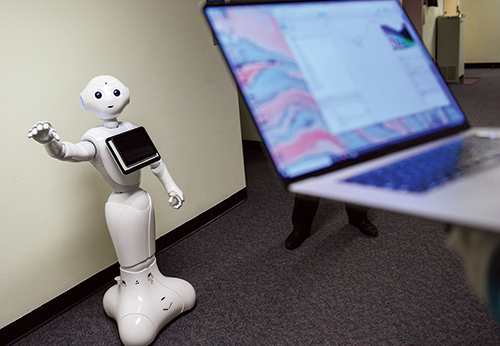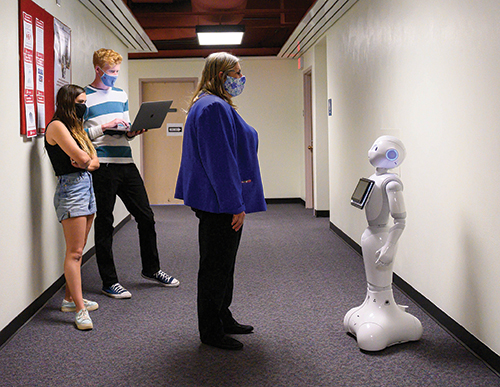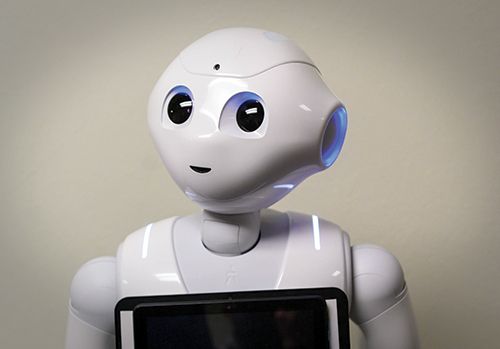Pepper is just under four feet tall, but he has no trouble interacting with people who tower over him. He proved as much in fall 2020 when he made his debut at NMSU’s student-run 100 West Café, working as a host – although he raised a few eyebrows.
That’s because Pepper is the world’s first humanoid robot programmed to recognize human emotion and engage with people through conversation and a touch screen. He was part of an exploratory study at NMSU to evaluate robot interactions with humans, a collaboration between Betsy Stringam of the School of Hotel, Restaurant and Tourism Management and Marlena Fraune of the Department of Psychology. Their research team also included two graduate students, Rebecca Skulsky and Harrison Preusse.
“Almost since ‘The Jetsons,’ we’ve been able to do things automatically or automated. In the hospitality industry, customers have to accept it as a level of service,” Stringam says. “With this study, we wanted to see how Pepper interfaced with people and if consumers were willing to accept service from a robot.”
As a host, Pepper checked in customers for the dining room and handled take-out orders. At the touch of a button, he would also dance and provide general information about 100 West Café and its menu. While some customers enjoyed their interactions with Pepper, he was a hard sell for others.
“There was a general lack of trust. I don’t know if that’s because people have seen too many robots go wild in science fiction movies, but we were surprised people refused to interact with him,” says Stringam, who hopes to further the research over time.
For Stringam, the Pepper project represents one piece in a greater interest area centered on technology in the hospitality industry. She’s part of a group of researchers from across the nation that studies technology’s impact on the hospitality industry workforce in a project headed by Carnegie Mellon University. As the Digital Faculty Fellow for the NMSU College of Agricultural, Consumer and Environmental Sciences, she played a critical role in supporting faculty in the transition to online learning spurred by the coronavirus pandemic. She’s also written a chapter on hotel and guestroom technology for an upcoming textbook, “Hospitality and Tourism Information Technology.”
“In the industry, we are moving technology forward with leaps and bounds for several reasons,” she says.
For one, technology is less expensive and more reliable, and therefore more desirable, Stringam says. The pandemic also pushed hospitality businesses to adopt new technology at warp speed to meet consumer demands for contactless experiences, she adds. She believes workers should embrace technology in the workplace – not fear it – as a tool to make their jobs easier.
“Technology can be fun, and it can help do our jobs better,” she says. “I don’t think the goal at the end of the day is to replace the work. It’s simply freeing up employees to do better work.”
In her HRTM classes, Stringam addresses technology’s role in the workforce. Students in her undergraduate classes come up with a design for a hospitality robot, much like Pepper, and students in her graduate-level courses write technology proposals that have to consider the impact on the workforce.
“HRTM is fortunate to have Dr. Stringam at the forefront of this interdisciplinary research and teaching about hospitality technology, especially its role on the workforce,” HRTM Director Jean Hertzman says. “It is essential that we incorporate it into all our HRTM classes to prepare our students to lead the future of the hospitality and tourism industries.”




Dove Hall, Room 212
305 N. Horseshoe Drive
Las Cruces, NM 88003